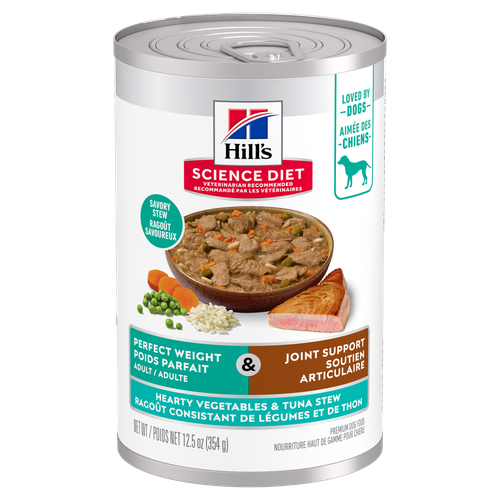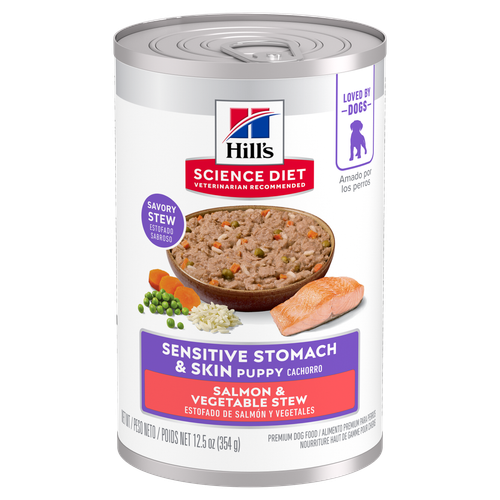
-
Find the right food for your petTake this quiz to see which food may be the best for your furry friend.Find the right food for your petTake this quiz to see which food may be the best for your furry friend.Featured products
 Adult Perfect Weight & Joint Support Hearty Vegetables and Tuna Stew Dog FoodShop Now
Adult Perfect Weight & Joint Support Hearty Vegetables and Tuna Stew Dog FoodShop Now Sensitive Stomach & Skin, assortiment de conserves
Sensitive Stomach & Skin, assortiment de conservesHill's Science Diet Sensitive Stomach & Skin Variety Pack
Shop Now Healthy Cuisine, Adulte, assortiment de conserves
Healthy Cuisine, Adulte, assortiment de conservesHill's Science Diet Healthy Cuisine Variety Pack
Shop NowFeatured products Adult 7+ Tender Chicken Dinner Cat Food
Adult 7+ Tender Chicken Dinner Cat FoodWith delicious chunks in a decadent gravy
Shop Now Perfect Weight Salmon & Vegetable Canned Cat Food
Perfect Weight Salmon & Vegetable Canned Cat FoodOver 70% of cats lost weight within 10 weeks when fed this nutrition
Shop Now Adult Chicken & Spinach Casserole Cat Food
Adult Chicken & Spinach Casserole Cat FoodWith delicious chunks in a decadent gravy
Shop Now -
Dog
- Dog Tips & Articles
-
Health Category
- Weight
- Food & Environmental Sensitivities
- Urinary
- Digestive
- Joint
- Kidney
- Dental
- Cancer
-
Life Stage
- Puppy Nutrition
- Adult Nutrition
- Senior Nutrition
Cat- Cat Tips & Articles
-
Health Category
- Weight
- Skin & Food Sensitivities
- Urinary
- Digestive
- Kidney
- Dental
- Stress
- Cancer
-
Life Stage
- Kitten Nutrition
- Adult Nutrition
Featured articles Pet Food Storage Tips
Pet Food Storage TipsDiscover how and where to store your dry, as well as canned, dog and cat food. Learn how to find the "best before" dates on all Hill's pet food packaging.
Read More The Incredible Science Behind Your Pet's Microbiome
The Incredible Science Behind Your Pet's MicrobiomeLearn what a pet's microbiome is, how it contributes to your pet's gut & overall health, and why nutrition is important in maintaining healthy microbiomes.
Read More Compare Your Pet Food's Calories to Other Brands
Compare Your Pet Food's Calories to Other BrandsCompare Hill's Science Diet dog and cat food's calories against other pet food brands and AAFCO recommended maximum calorie count.
Read More -


Understanding the role of antioxidants for pets in overall health and well-being can help you make confident, informed choices and provide the best care for your pet. However, to understand antioxidants, you have to understand free radicals and oxidative stress, too.
Dive into the wonderful world of antioxidants, including how they fight free radicals to help your pets live healthier lives and how to ensure your furry friend gets enough of these protective nutrients from the ingredients in dog or cat food.


Tasty Tips
Young pets may need several visits in their first year for vaccinations. Adult pets generally benefit from annual check-ups, while senior or special-needs pets might require more frequent visits.
What Are Free Radicals?
Free radicals are a byproduct of energy production within the body. Highly reactive, oxygen-containing molecules with a missing electron, they can damage cell membranes, enzymes and even DNA in their quest to stabilize themselves by stealing electrons from other molecules.
These unstable molecules pose a particular risk to the cells of your pet's nervous and immune systems. Due to the damage they cause on a cellular level, free radicals are considered a factor in the progression of disease and premature aging in dogs and cats.

Sources of Free Radical Damage
In addition to your pet's metabolism, external factors can also generate free radicals, such as:
- Air pollution
- Cigarette smoke
- Exposure to toxins, such as pesticides
- Radiation
- Bacterial, viral or fungal infections
- Intense or prolonged exercise
A dog or cat's body can normally handle free radicals. It's only when the amount of free radicals becomes excessive that they can have detrimental effects on your pet's health. This is where antioxidants come in.
What Are Antioxidants?
Antioxidants neutralize free radicals. Antioxidants for pets (and humans, for that matter) exist in a variety of essential nutrients. They're not specific ingredients, but rather a chemical property found in certain ingredients, such as colorful fruits and vegetables. The right combination of antioxidants in cat or dog food can help protect your pet's health by minimizing free radical-induced cellular and tissue damage.
Your pet's body has natural antioxidant defenses that provide some protection against free radicals. However, balanced levels of antioxidants in nutrition — such as vitamin E, vitamin C, beta-carotene and selenium — support that existing defense. For example, research shows nutrition containing a blend of vitamin E, vitamin C and beta-carotene improved antioxidant status and enhanced cellular protection in dogs and cats.
Antioxidants are also used to preserve dry pet food, often appearing as "mixed tocopherols for freshness" on the ingredient list. By scavenging free radicals, they help prevent food from spoiling, preserving nutrient potency and maintaining texture, color, taste and aroma. This extends your pet food's shelf life and helps ensure their food is fresh and nutritious.

"The best way to ensure your pet is receiving optimum levels of antioxidants is to feed them complete and balanced nutrition for their life stage."

What Do Antioxidants Do for the Body?
Antioxidants help protect your dog or cat's body — including cells, tissue and DNA — by preventing free radical damage and oxidative stress. Here are some examples of what different antioxidants do:
- Vitamin E helps neutralize free radicals.
- Vitamin C inactivates free radicals and regenerates vitamin E, restoring its antioxidant activity.
- Selenium helps prevent cellular damage and enhances vitamin E activity.
- Beta-carotene works together with vitamin E to scavenge free radicals.
Conditions Associated With Free Radical Damage
Antioxidants may help reduce the risk of many health conditions by lowering inflammation and oxidative stress, including:
- Cancer
- Skin inflammation
- Inflammatory bowel disease
- Heart disease
- Kidney disease
- Diabetes mellitus
- Premature aging
- Cognitive decline

Boosting Your Pet's Antioxidant Defense
If you've read this far, you may be wondering how to effectively provide your pet with enough antioxidants. Like most things nutrition-related, balance is important. Some antioxidants work synergistically when combined in specific amounts, while other antioxidants can pose harm in excess.
The good news is that veterinarians, nutritionists and food scientists have taken the guesswork out of the game for pet parents by formulating pet food with specific levels of key antioxidants to support immune system health and fight free radical damage. The best way to ensure your pet is receiving optimum levels of antioxidants is to feed them complete and balanced nutrition for their life stage. Your vet can recommend options for cat food or dog food for your pet's unique circumstances.
As you can see, antioxidants are important to your pet's well-being. When combined with exercise and regular veterinary care, they can help support your pet's overall health. The best and easiest way to give your pet the appropriate amount and combination of antioxidants is with complete and balanced nutrition. That way, you have peace of mind that you're meeting your cat or dog's nutritional needs at each life stage.


Dr. Sarah Wooten graduated from UC Davis School of Veterinary Medicine in 2002. A member of the American Society of Veterinary Journalists, Dr. Wooten divides her professional time between small animal practice in Greeley, Colorado, public speaking on associate issues, leadership, and client communication, and writing. She enjoys camping with her family, skiing, SCUBA, and participating in triathlons.
Related products


Hill's Science Diet Healthy Cuisine Variety Pack

Hill's Science Diet Sensitive Stomach & Skin Variety Pack

Gentle on stomachs while nourishing skin & supporting development in growing puppies
Related articles

Compare Hill's Science Diet dog and cat food's calories against other pet food brands and AAFCO recommended maximum calorie count.

Learn why nutrients like antioxidants & amino acids can help improve your pet's immune system, as well as top antioxidants to look for in pet food.

Discover how and where to store your dry, as well as canned, dog and cat food. Learn how to find the "best before" dates on all Hill's pet food packaging.

Learn what a pet's microbiome is, how it contributes to your pet's gut & overall health, and why nutrition is important in maintaining healthy microbiomes.

Put your pet on a diet without them knowing
Our low calorie formula helps you control your pet's weight. It's packed with high-quality protein for building lean muscles, and made with purposeful ingredients for a flavorful, nutritious meal. Clinically proven antioxidants, Vitamin C+E, help promote a healthy immune system.
Put your pet on a diet without them knowing
Our low calorie formula helps you control your pet's weight. It's packed with high-quality protein for building lean muscles, and made with purposeful ingredients for a flavorful, nutritious meal. Clinically proven antioxidants, Vitamin C+E, help promote a healthy immune system.

